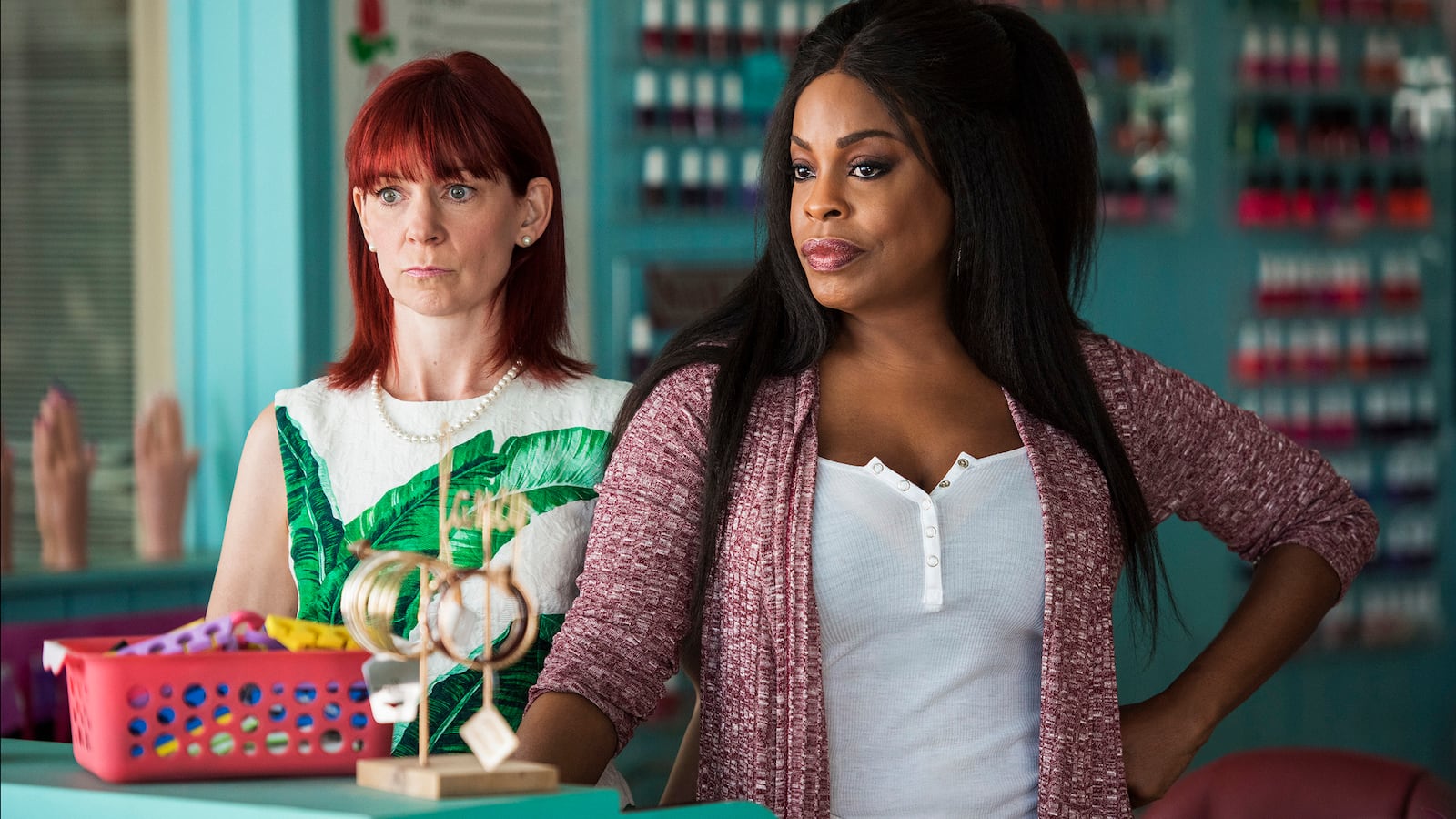“You know how people say that eyes are the window to the soul? Well I don’t think so. For me, it’s nails.”
That’s what Niecy Nash’s Desna says in an early episode of TNT’s riotous new drama Claws, about manicurists at a West Florida nail salon who find themselves cuticle deep in a spiraling crime ring. And Desna’s nails? They’re colorful, verging on flamboyant. They are adorned, studded, and swirled, fake as hell but authentically hers. They are attention-grabbing. And they are sharp, viciously so.
The selling point of Claws is the existence of the show in the first place. On its premise alone, it’s been described as “Steel Magnolias meets Breaking Bad”—and carries with it all the flaws and glories that sort of labeling implies.
There are salons and antiheroes, outlandishness and melodrama. There are tropes and clichés. There is style and there is fun, and there may be an instinct to dismiss the show for those reasons. Just as for certain audiences (yours truly included), there is an instinct to embrace the show for a slew of other reasons, including the cast, the feminism, the nails, and the baseline camp of it all.
Desna is the den mother of the Nail Artisans of Manatee County. She has her regal lion’s mane of hair and requisite penchant for animal print fashion, but more importantly a ferociousness with which she protects her cubs: best friend and salon’s right-hand woman Jen (Jenn Lyon); the enigmatic and loyal Quiet Ann (Judy Reyes), who happens to be a lesbian; and Carrie Preston’s pearls-and-cardigan Polly, the poised fount of oddities with an eclectic past.
Desna is one of the freshest takes yet on what has become TV’s stalest archetype: the well-meaning, salt-of-the-earth everyman (or in this case everywoman) who gets mixed up in something uncouth, betrays her morals, and gets in too deep—but always with the heart of gold. In his case, though, the heart isn’t just gold. It’s striped and rainbow colored, brimming with more feminine personality than the age of prestige TV usually lets us see.
When we meet Desna, she’s mixed up with the Dixie Mafia through her current boyfriend, a grills-wearing buffoon named Roller. She’s been helping Roller launder money through a very illegal “pain clinic” at a strip mall—junkies come to get their prescription pills—for his boss, Uncle Daddy, played by Breaking Bad’s Dean Norris in the series’ biggest and perhaps most ridiculous performance. (The network’s official description of Uncle Daddy: “a larger than life, dangerous, deeply Catholic bisexual.”)
For Desna, it’s the means to an end: her dream of opening a more upscale salon away from dingy Palmetto in the more affluent Sarasota. But she needs her payout from the crime ring to make the down payment, and when Uncle Daddy and Roller stiff her, she’s pissed. Adding insult to injury is Roller’s dalliance with Virginia (Karreuche Tran), a stripper whom Roller insists Desna hire at the salon, but who begins sleeping with him, too.
To say more about the plot would spoil it—beyond saying that Desna and Virginia end up allies despite their mutual hatred—but also would give more credit to the weakest element of the series.
It’s the girls’ descent into a life of crime that surfaces the most maddening genre clichés and predictabilities. Do things look they’re finally going well for Desna? Does it seem like she’s gotten away with something? Might she be happy? That the house of cards is going to fall each time there’s a moment of peace is so inevitable you want to give it a good huff and blow it down yourself to save some time.
(Though we’ll admit that critics were given three episodes, which end on a cliffhanger that seems as if it could redirect the entire series in that regard.)
What you bask in while watching Claws is the world that’s been created, and the women who populate it. It’s a world maybe you don’t quite understand but is so meticulously crafted that it doesn’t become hick tourism, but instead a heightened version of an already colorful reality.
These are women and characters that we have seen on screen before—the stripper who enters the room sucking on a lollipop, the diva strutting in her catsuit and fake nails, the unassuming workers at a salon—but whose stories are marginalized or ignored. They’re in the background of a room while the men talk, a “scene-stealer” never to be heard from again, or a narrative tool meant to further the plot, not direct it.
The trick of Claws, and when it really works, is the dignity the actresses give these women and their stories. As she’s proven time and again—most recently in Scream Queens and her Emmy-nominated turn in Getting On—Nash is adept at making the “big” believable, managing to crackle with personality and still be soulful, and find as much payoff in brash, brilliant comedy readings as she does in the silent moments.
And it’s when the show springboards off that kind of established realism into its unbridled ridiculousness that it really excels.
“He wanted you to wrestle on the pizza, didn’t he?” is an actual line. There’s a funeral procession that includes strippers on poles, a buffet of Little Debbie snacks at the memorial service, and a reading from Total Recall, the autobiography of Arnold Schwarzenegger.
In one pivotal scene, Nash in a skintight denim jumpsuit and Tran wearing a fur coat and lucite heels scramble to hide a dead body, a sight gag that is both surreal and also maybe the exact storyboard that sold TNT on the wild aesthetic of the entire show.
The tonal balance Claws attempts is ambitious. And though it doesn’t always, it’s a real hoot when it, ahem, nails it.






